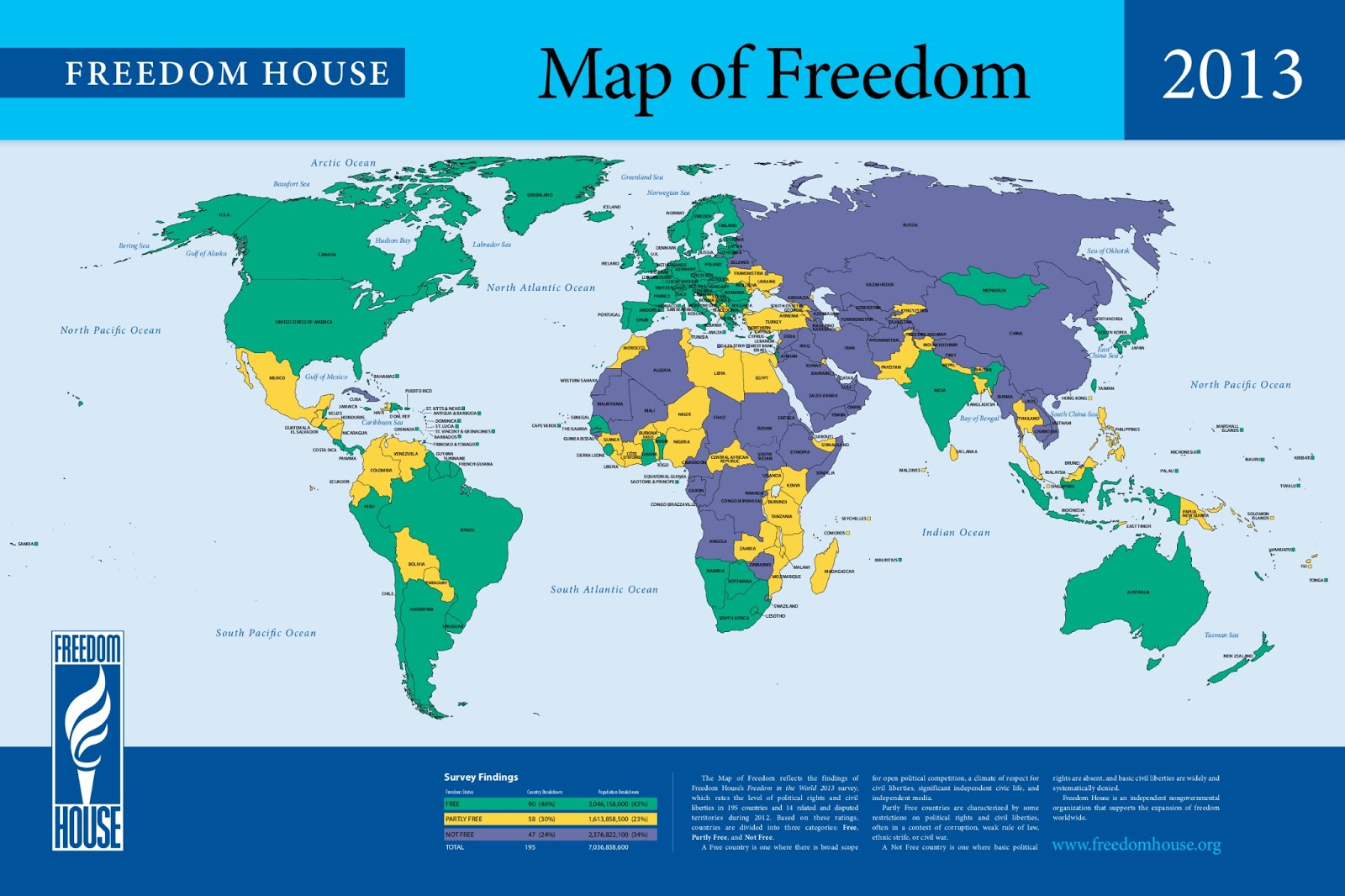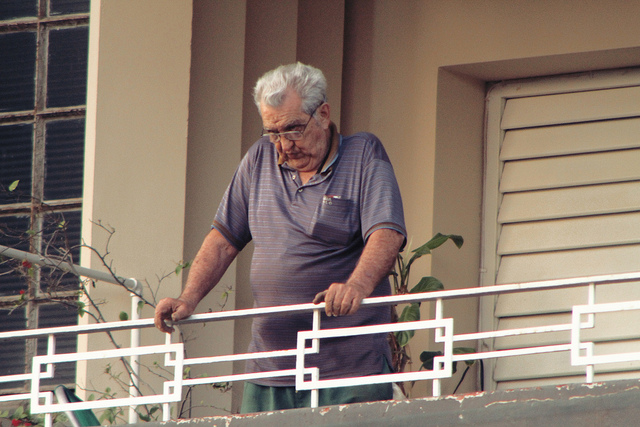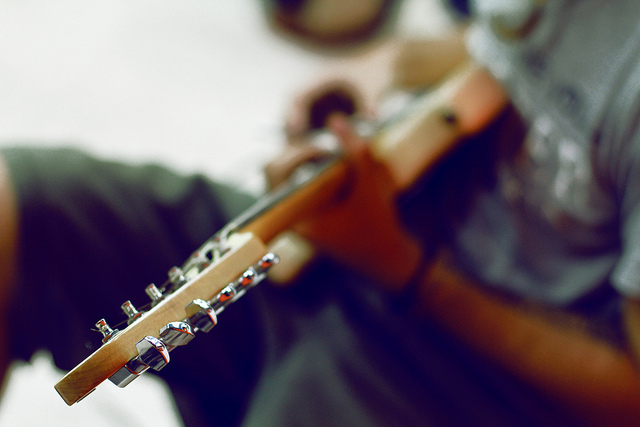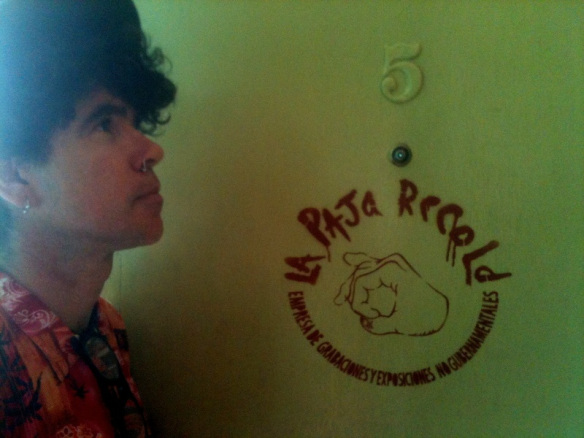
To Nobody’s Surprise Cuba is Second Worse in Censorship and Violation of Internet Users’ Rights / Angel Santiesteban
There is no exam that the Castro dictatorship has passed to prove that it is not a tyrannical, despotic, cruel, repressive, abusive, corrupt and inefficient regime.
Freedom House has once again tested the freedom of use of internet in the countries which make up the world’s concert of nations and Cuba, Castro’s Cuba, as it couldn’t be any other way, was placed in the penultimate position on the list, together with China and only just above Iran.
Freedom House documented how the Internet in Cuba continues to be — when it’s not an unattainable fiction for 95% of the population — a trap by the political police to control those who use the internet for personal means and to prosecute and jail those who use it to denounce the violations which are committed by the regime against its people who demand liberty, justice and democracy in Cuba.
Among this wide spectrum of the harassed, persecuted and imprisoned by the military arm of the Raúl Castro Ruz dictatorship, are the peaceful activists who are unceasing in their efforts to restore freedom to Cuba. Be they bloggers, members of organizations like the UNPACU or the Ladies in White, intellectuals like Angel Santiesteban-Prats or independent journalists. continue reading
The period which the report focuses on is the period from May 2012 to April 2013. As a result it does not include the opening of the internet access points which were created last June that would have “added” some points in favor of the regime, but then these were drastically lost by allegations that have been made about them, for example, that the right buttons of the mice on the PCs were deactivated, preventing users from using the option to “copy and paste”.
Later also, the repression against independent journalists and activists in general who denounce all the abuses of the regime across Twitter has grown so overwhelmingly, reaching the highest figures of the last four years. Among the most scandalous cases of State violence against an indefensible woman who was only defending her ideas, it is necessary to add the case of the actress and blogger Ana Luisa Rubio who, due to the time-frame, doesn’t appear in the report.
Controlling the use of the internet and along with that applying outright censorship to the sites which Cubans can access or not, violating the privacy of emails, suspending accounts, and what is much more serious, exercising direct violence on those who make use of “almost” free internet thanks to connections supplied by foreign embassies or tweets via telephone at unfair prices paid for by international solidarity, it is possible for the state monopoly telephone companies, while lending themselves to the political police so that they can subjugate and rail against its users, to profit shamelessly at their mercy.
My objective here is not to relay the information contained in Freedom House’s report, but to highlight the huge value it has and appeal to all those who read it and share it so that the world knows the truth about what happens in Cuba through serious and well documented reports. For those who still don’t quite believe or understand what is happening in Cuba for over half a century, it is essential to be aware of this type of reliable information and not the the vast number of pamphlets which circulate everywhere, without foundation and which do not help to give any credibility to the cause for a just and free Cuba.
The Editor
Download and read the report by clicking on the link here.
Freedom House Cuba 2012-2013
Translated by Shane J. Cassidy
7 October 2013
Ana Luisa has been beaten: I call intellectuals and artists for the honorable stance that this people need / Angel Santiesteban
I cannot get used, and I will not stop denouncing and demanding, whenever I know about a savage act consented to by the government, which does not condemn the punishable, and the complicit silence of social institutions, particularly CENESEX*, which advocates respect for the law, and especially UNEAC**, the victim being on this occasion Luisa Rubio, a female artist.
These female intellectuals who recently were the standard-bearers of a campaign against gender violence, how do they manage to continue living, full of guilt? This incident has a range beyond a gender issue, it comprises a humanistic feeling, and it is alarming that members of society assume behaviors that border on savagery. A Revolutionary does not abuse, does not volunteer to join a horde to beat helpless fellow citizens, then, what kind of Revolution they are talking about on official speeches?
I cannot keep looking at the pictures of Ana Luisa beaten, it hurts so much , it hurts deeply, I feel it on my own flesh, I’m really angry, anger explodes within my heart. I can better endure my rights being trampled on, than this being done to a family member or a friend, that means the same to me, and even to a stranger.
I decided to be an opponent because I rise up against abuses, and so I’m willing to die in the attempt. Nothing justifies violence, but in Ana Luisa’s case, we are talking about a woman, kind and sensitive. She exudes kindness. On several occasions I visited her, I was able to observe the surveillance they kept at her home, both on the part who was on duty at the premises of the Communist Party which is located in front of her home, as well as her neighbors, because they do it fully exposed.
Ana Luisa told me that when she has tried to report the abuses, refusing to leave the police station without being heard, she has been hustled by force, going as far by throwing her down the stairs causing severe fractures. Whoever observes the marks of the beating, will understand how inhuman the attackers were. The way they did it, it is clear that the attack was premeditated, using little children to ring the bell, pretending to annoy her, they made her come out and they committed their wrongdoing.
I will ask again intellectuals and artists, until they listen to me, that they adopt the honorable stance that this country is demanding and people need as a guide.
With regard to the actress and human rights activist, Ana Luisa Rubio, we should await that justice comes, which will knock infallibly on everyone’s door.
Ángel Santiesteban-Prats
Lawton Prison Settlement. September 2013
Translator’s notes:
*CENESEX is the Center for Sex Education, which is run by Raul’s daughter, Mariela Castro.
**UNEAC is the Writers and Artists Union of Cuba
Translated by Gualdo Hidalgo, Executiveeditor@latinhf.com
16 September 2013
Eliezer Avila Commits to a Green Party / Lilianne Ruiz
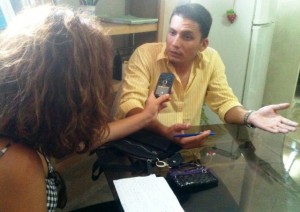 Cubanet interviewed Eliezer Avila, the computer scientist who once faced Ricardo Alarcon, former president of the National Assembly. He moved to the capital in order to participate more directly in the changes in civil society.
Cubanet interviewed Eliezer Avila, the computer scientist who once faced Ricardo Alarcon, former president of the National Assembly. He moved to the capital in order to participate more directly in the changes in civil society.
What have you been doing in your public life lately?
Since I arrived in Europe I have focused on my personal life. One of my biggest frustrations was that I’ve always lived nearly 500 miles from the capital (in Puerto Padre, Las Tunas). I had to take a bus or a train and travel sometimes for days in order to participate in public life, which is not only all that is written which overseas readers may read, but what happens in debates within of Cuba, within the intelligentsia who, with or without criticism, is what touches us.
We must mention the debates of the journals Temas [Themes], Espacio Laical [Lay Space], a series of good debates, in which I want to participate. Then, making an effort to be able to insert myself in a more coherent and consistent way in public life, I have had to spend the last two months to stabilize my life in the city of Havana.
From your previous social work we perceived you as a human rights activist and then a freelance journalist. But you have defined yourself as a politician. So: What political leaning do you identify with? Socialism, Social Democracy, Liberalism?

I said in an interview with Bayly (in Miami) recently, that I define myself as a rational politician, perhaps a mix of “liberal center.” The truth is that I have infinite belief in individual freedom as the sole driving force of initiative, progress, the maximum effort to get ahead, and freedom. Now, I also believe in social responsibility, and I believe in a government that offers opportunities.
In European politics, as far as I could see, especially in the Nordic countries, there is a strong tendency for political rationality. That is, the issue we are talking about is the specific issue of what we should do. We don’t have to look through black or white glasses. We are going to study the issue in its totality and make a decision that at times could be a little to the left and at times a little to the right. The truth is it’s looking for the better good. I lean that way.
There are a ton of projects there that don’t consider economics, but the tendency of the left says that we have to do them because they sustain a group of services, of subsidies, because this is a social policy of interest to the left. But, well, it’s an economic disaster, that ends up undoing the policy itself because of the lack of resources to sustain what remains on the large screening, that can’t even sustain itself, and then, which way do I lean? For a balance between what is efficient and what is necessary.
Although you have defined yourself as a politician, Somos + [We Are More] is not a party but a movement. Has it been founded yet?
We are at the stage of conceptualization. I’m trying to gather a nucleus of people, especially young people; university students, workers. I’m looking for young people who aspire to have a future in Cuba. We can design a proposal addressing different subjects, in accordance with our dreams for a future for everyone in the country, including those who today make up a part of any political tendency.
The new acquisition of Somos + is a specialist in biology, who is designing the policy proposals in the environmental field, which in Cuban is disarmed. We want to have economists, sociologists, workers. That is, we want to have a directing nucleus of the Movement as diverse and comprehensive as possible. And we are engaged in this effort. We have not yet officially launched the Movement.
You also said that the Movement could accept some communists as members. What, then, is is precisely the purpose of Somos +?
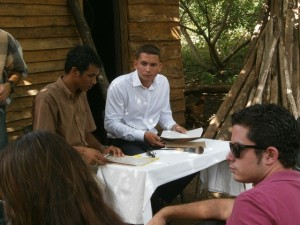 The point of departure of our Movement should be, above all, the most common demands of the largest possible number of Cubans. I know Communists who are Democrats. So, we are associating with tendency to the left, a hegemonic opinion, dictatorial, that doesn’t have to be that way. In Spain there are communists, in France, in Canada, the United States is full of communists who are democrats. Because they respects the rights of everyone else who are not communists to compete politically, fair and square, and to create a social balance, based on what we all think. Then, you can have whatever political position you have and at the same time be a democrat. What I will always defend is that our Movement is democracy. There’s no room for doubt about that. We will not accept people who are not democrats, that’s it. But for me, I don’t think it’s necessary to label people and ask them what color they are for them to be, in one way or another, a part of the Movement…
The point of departure of our Movement should be, above all, the most common demands of the largest possible number of Cubans. I know Communists who are Democrats. So, we are associating with tendency to the left, a hegemonic opinion, dictatorial, that doesn’t have to be that way. In Spain there are communists, in France, in Canada, the United States is full of communists who are democrats. Because they respects the rights of everyone else who are not communists to compete politically, fair and square, and to create a social balance, based on what we all think. Then, you can have whatever political position you have and at the same time be a democrat. What I will always defend is that our Movement is democracy. There’s no room for doubt about that. We will not accept people who are not democrats, that’s it. But for me, I don’t think it’s necessary to label people and ask them what color they are for them to be, in one way or another, a part of the Movement…
Have you been inspired by any movement within or outside Cuba to conceive the idea of the Somos+ Movement?
I would say I’ve had very broad influences. I have had excellent conversations with leaders of movements in Cuba. For example, José Daniel Ferrer, a person I admire and respect very much. Other people who are not actually a political movement, but they do have some very interesting ideas for the future of Cuba , such as Antonio Rodiles, Yoani Sanchez, Dagoberto Valdés and well, a long list… They have nurtured me in all this, but also the trip to Europe, especially to northern Europe, where I think they are the most balanced politics in the world… The German Green Party really left me very inspired… I like doing politics that way. A relaxed politics, no angry grand passions that try to move the world, a conversational politics. I saw in the German Parliament the most heated political discussions, and then everyone has a glass of wine, hugs each other, shakes hands.
This to me seems to be the best example I’ve seen of what we have on a small island. We don’t have to have these great conflicts that some people want to encourage until they’re unsalvageable. We have the same language, the same idiosyncrasies, we have the same aspirations. What do we want? A state of decent comfort, of dignity, a freedom of information that allows us to be believe we have entered the world, and we are not in a small cave in the Caribbean and that we are not part of the development.
We want to be respected for our work, we want to be paid, and according to this we can have the life we deserve.
Why are you leading Somos + instead of joining one of the already established movements within the opposition?
It has always seemed necessary to me for a new seed to be born, a new flower, that is not conditioned, permeated by a group of things that can be positive or negative but that have been longstanding.
It is good to assume responsibility for success if we achieve it, but also bear the weight of failure if it comes to that. It is very interesting to travel this whole road, we have the right, as a new generation, to make mistakes, to forge our way, to be neither better nor worse than those who started earlier and whose work I respect.
Now I want to ask questions to get an idea of your profile: What books do you read, what music do you like, what movies do you remember?
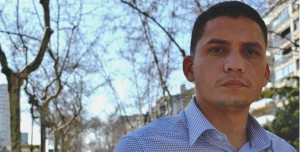 I like old music, from the ‘70s and ‘80s, in English and in Spanish. As I am a computer scientist I’m passionate about programming sometimes whole nights, whole weeks, without going to bed, listening to a lot of hard rock, “System of a Down,” “Nightwish.” Movies: I very much like historic films, and adventures. I like all the movies about World War II, including the reflections of those who make you questions yourself, to think about the essence of humanity itself, above all, this capacity to create hatred. I really like “Life is Beautiful.” At the same time I very much like movies that exalt human valor. In books, as in movies, and in music, I like true stories. I was reading “The Rage and the Pride” by Oriana Fallaci. I finished reading the novels of Padura. I like Cuban writers who defined an era, with a writing that was very brave for its time, because it was ahead of many things that happened then.
I like old music, from the ‘70s and ‘80s, in English and in Spanish. As I am a computer scientist I’m passionate about programming sometimes whole nights, whole weeks, without going to bed, listening to a lot of hard rock, “System of a Down,” “Nightwish.” Movies: I very much like historic films, and adventures. I like all the movies about World War II, including the reflections of those who make you questions yourself, to think about the essence of humanity itself, above all, this capacity to create hatred. I really like “Life is Beautiful.” At the same time I very much like movies that exalt human valor. In books, as in movies, and in music, I like true stories. I was reading “The Rage and the Pride” by Oriana Fallaci. I finished reading the novels of Padura. I like Cuban writers who defined an era, with a writing that was very brave for its time, because it was ahead of many things that happened then.
How do you intend to add more people to Somos +, taking into account the fear that people have of reprisals from the government with its repressive apparatus?
First, I don’t think I should feel badly that no one has beaten me, I haven’t been in jail. Then, I think it is normal that it happens, that many people tell me, “I don’t want to sign up, I don’t want anything to happen to me.” You have to show these people that they are standing on safe ground. A ground in which I have confidence and which anyone can also rely on because there is nothing hidden. Political transparency can, in every sense, be a weapon that will help us to add many people.
The underground Cuban opposition has its advantages and disadvantages. One of the greatest fears that I have is that once we engage in politics in a democracy, too many people were accustomed to hiding.
This recent event with the musician Roberto Carcasses asking for changes at the concert of September 12, do you think it’s a sign of new times ?
I think so, recently I was talking to my wife. There are many people who are willing to assume some measure of responsibility for what touches them, according to their place in society, and I mean artists, intellectuals, many people who have responsibilities within the media …
People who travel, and Robertico Carcassés is one of them, they realize that in the whole world today a new wave is happening, they sometimes say, “Well good, the Arab countries are being shaken up.” I think the whole world is being shaken up…. These people who travel, who leave, they are seeing everything that is happening, when they get to Cuba it’s like traveling back in time 54 years… Sometimes there are situations like that of Robertico Carcasses, which I think it was mostly an awakening of consciousness that marks a before and after. It marks a precedent, as did what happened at the University of Information Sciences (UCI) as well.
With that speech I had the opportunity to make … It raised the bar a little of what would be done and what could be criticized, and after there was a trend in the newspaper Granma, in the News, of creating spaces where people began to discuss a set of issues . Well, I think it is very healthy and very necessary for a country to have things happen like with Robertico Carcassés … Far from being the exception, it should be the rule.
It’s said that the reforms within Raul Castro’s government are a fraudulent change, and that one of their tactics is the replace the real opposition, organic within the society, with what the spokespeople themselves have called a “loyal opposition.” If you agree with this opinion, what do you think of this phenomenon?
Today what we have in this second stage, to give it a name, in the government of Raul Castro, is a setback, including a discourse that already seems to come from the past. We have seen once again the pioneers reciting with their neck veins bulging, almost in the style of the “open platform.” We have reading in the newspaper again these discourses that label things “Revolutionary” and “truly Revolutionary,”or that abuse the word Revolutionary.
Yes, but when I gave the example of what they call loyal opposition, I was thinking of places like the official blogosphere, where there is a certain amount of criticism, but it is fabricated by the government to create an impression of openness…
I also include that in what I was saying. In any of those spaces even La Joven Cuba could enter, but the result is that you can fool some of the people some of the time, but you can not fool All of the people forever. These spaces were opened and people began to feel a catharsis there. It turns out that criticism is only the first link in a chain of a process that should end with political decisions. Then, something very interesting has happened in Cuba, it is that we have already talked too much. We bring too many years of criticizing.
Lilianne Ruiz, From Cubanet
4 October 2013
San Rafael Boulevard: Showcase of Failure / José Hugo Fernández
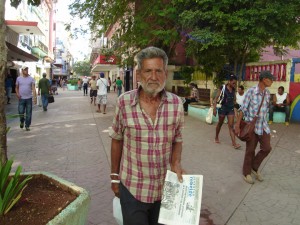 HAVANA, Cuba, October, www.cubanet.org – What was Raul Castro thinking when, some days ago, in a meeting with the Council of Ministers, he said they are “doing experiments in order to” address the effects of the aging of the Cuban population? It’s not that one wants to take a shot at everything our chiefs say, but it would be easy to understand the reasons we start to tremble as soon as we hear the word “experiment” on their lips.
HAVANA, Cuba, October, www.cubanet.org – What was Raul Castro thinking when, some days ago, in a meeting with the Council of Ministers, he said they are “doing experiments in order to” address the effects of the aging of the Cuban population? It’s not that one wants to take a shot at everything our chiefs say, but it would be easy to understand the reasons we start to tremble as soon as we hear the word “experiment” on their lips.
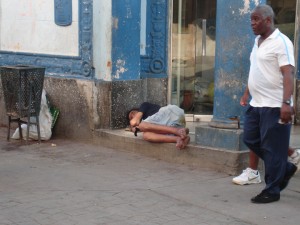 For example, could they be thinking about experimenting with the abandoned elders who have now turned Havana’s San Rafael Boulevard into a showcase of the futility, lack of attention and neglect of the regime?
For example, could they be thinking about experimenting with the abandoned elders who have now turned Havana’s San Rafael Boulevard into a showcase of the futility, lack of attention and neglect of the regime?
It’s enough to walk a few blocks on this populous street to form a rough opinion of the drama of the old people whose fate rests on the streets of Havana, without any family support and without any government help, which now and again brings the police down on them, piling them into their cages like mangy dogs.
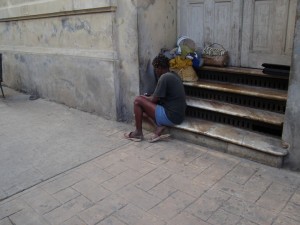 “To the old people who have to be cared for as if they were children, especially those who have been working,” Raul Castro also said at that meeting, which also scares us, not only for fear of what could happen to the children if the authorities stuck literally to their words, but for the exception they make with respect to “those who have been working.” Did he mean to say that those who didn’t work for the State have no right to be cared for in their old age? And how will these bureaucrats classify these old people, who have no record nor identification nor more property other than the rags they are wearing, to make it clear who deserves or doesn’t deserve to be cared for according to their former occupations?
“To the old people who have to be cared for as if they were children, especially those who have been working,” Raul Castro also said at that meeting, which also scares us, not only for fear of what could happen to the children if the authorities stuck literally to their words, but for the exception they make with respect to “those who have been working.” Did he mean to say that those who didn’t work for the State have no right to be cared for in their old age? And how will these bureaucrats classify these old people, who have no record nor identification nor more property other than the rags they are wearing, to make it clear who deserves or doesn’t deserve to be cared for according to their former occupations?
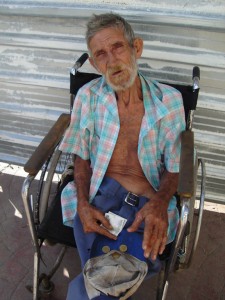 Although the chiefs pretend not to take notice, as disheartening as is the increasing aging of the Cuban population, so is the aging of the Fidelist system, not only with regards to the ages of its principal representatives. Also, and especially, the ton of years they have remained imperturbably with the upper hand, anchored in the same speech and in the same aberrant and retrograde experiments of yesteryear.
Although the chiefs pretend not to take notice, as disheartening as is the increasing aging of the Cuban population, so is the aging of the Fidelist system, not only with regards to the ages of its principal representatives. Also, and especially, the ton of years they have remained imperturbably with the upper hand, anchored in the same speech and in the same aberrant and retrograde experiments of yesteryear.
Thus, I see they have nothing left but to experiment with themselves, retiring together, now that there is still time, as the only way to stop the tragedy of our elderly homeless, as well as so many others who were motive and today are an impediment to the solution.
José Hugo Fernández
7 October 2013
From Cubanet
The Literature Ernesto Guevara Saved Us From / Luis Cino Alvarez
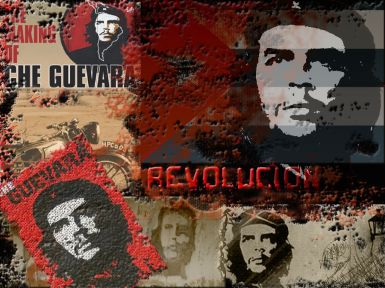 HAVANA, Cuba, October, www.cubanet.org – Che Guevara used to say that the history of the Cuban Revolution shouldn’t be written by others who were not its protagonists. The writers, whom he didn’t consider revolutionary enough, did not inspire confidence in this task.
HAVANA, Cuba, October, www.cubanet.org – Che Guevara used to say that the history of the Cuban Revolution shouldn’t be written by others who were not its protagonists. The writers, whom he didn’t consider revolutionary enough, did not inspire confidence in this task.
In fact, he himself, who did not lack a literary vocation and talent, was the first who ventured a narrative. Reminiscences of the Revolutionary War was good effort to start writing the story of the Castro insurrection, from the Sierra Maestra to the taking of Santa Clara.
In any case, although fragmented and incomplete, the result was much better when Guevara wanted to give expression to his military thinking in Guerrilla Warfare, which was a diffuse manual of insurgency tactic and strategy.
A few years later the Frenchman Regis Debray attempted what Guevara hadn’t achieved: to establish guerrilla theory. But Debray himself, after the publication of Revolution in the Revolution?, acknowledged that failure of his theories. It wasn’t easy to theorize about the fortuitous and almost providential events of the Cuban Revolution. The Castro insurrection, with disasters such as the attack on the Moncada Barracks and the shipwreck at the landing of the yacht Granma, could be dramatic examples of what a guerrilla movement should never do unless it aspires to suicide. Not all guerrillas have the luck of facing barely professional troops,corrupts and demoralized as was the army of the dictator Batista. Che Guevara’s disasters in the Congo and Bolivia tragically demonstrated this.
Nor did Che Guevara manage to clearly define his social and economic thinking in a book. Man and Socialism in Cuba is frightening in its immoderate and super-human statist idealism. With regards to the economy, for years the economists who are trying to ensure the survival of the Castro regime have unsuccessfully tried to work Che Guevara’s ambiguous and contradictory concepts into a body of practical and coherent ideas applicable to the Cuban situation.
Guevara considered socialist economic planning banal. “Without Communist morality, it doesn’t interest me at all,” he confessed to the French journalist Jean Daniel in 1963.
Today, Guevara’s thesis of creating two, three, many Vietnams… would be counterproductive to the reinvention of socialism, but with a market economy.
Che Guevara saved us the horror by not writing about his time as an executor of the Revolutionary terror in the La Cabaña Fort in the first months of 1959. It’s terrifying to imagine what his narrative may have been. The murdered puppy gives us an idea. The only account he wrote is impeccable, but very cruel. Bringing to mind the call to Revolutionary fighters to become, according to his own words, “cold killing machines.”
By Luis Cino Alvarez
From Cubanet, 7 October 2013
Sounds Good to Me / Miriam Celaya
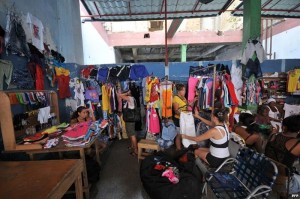
Things are looking bad for the sale of clothing, so much so that many of Havana’s retailers who pay to be licensed as seamstresses or tailors are concerned about what’s coming. As of 28 September 2013, an official provision has gone into effect establishing that they can only sell clothing made by hand, on pain of heavy fines and confiscation of all the industrially-made apparel they offer.
So far, the numerous private small business in Central Havana have remained open and are selling the same imported clothes, without any official operation taking place. But there is a grim anxiety circulating among them and they know it’s only a question of time before the hordes of inspectors and pack of uniforms come down on them.
Anais, one of the dozens of clothing vendors who have opened private businesses in Central Havana, has already lived four decades, and before having a self-employment license she knew how to make money working for herself. In fact she had a business selling imported clothing, which then came from State warehouses stores, through one of the multiple chains of smuggling networks that have proliferated on this Island since the bans were instituted as a method of governance.
So she shrugs her shoulders at the new official threat: “When I hear that the inspectors are about to come down this street (and I’m sure to hear ahead of time), I’ll close and go to the office and surrender my license. They’re not going to screw me over. I took all the merchandise I had in my house and put it in a safe place, so I will continue to sell “under the counter.” That’s what I’ve always done! Licensed or not, I’m not going to starve. We’ll see who has more to lose.”
Just half a block from Anaís a middle-aged couple complains. The man is more withdrawn and talks in monosyllables or just nods, approving what his wife says; she is more talkative, perhaps because she feels more confident talking to other mature woman like herself, or perhaps because she needs the catharsis.
I tell them who I am and what I do — something for which they don’t give out licenses in Cuba– but that doesn’t scare them one bit. “Just don’t use our names,” they ask me. Of course not, I don’t even ask. In reality, it’s not necessary, I’m just digging into what the media says, in what lies beyond the laws, the regulations, the statistics.
I’m more interested in people and their reasons than in the government’s regulations and the propaganda of its spokespeople. Life is on the streets, very different and distant from those who make the laws and what the media shows.
The woman tells me that a couple of years ago she took our a license as a dressmaker and began selling there, in the doorway of her sister’s house, and some time later, when they prohibited selling in doorways, she moved to the living room of the same house. It went well, so she was able to invest more money in merchandise and her husband also took out a license as a tailor.
Neither of them knows how to thread a needle, but she knows this business: before she was already “selling some clothes that just came my way, you knowl but always with a fear that the police would catch me. Once they took a backpack frull of t-shirts and I had to pay the owner from my own pocket.”
So when she saw the chance to earn money legally she took out a license. The official who helped her never said she couldn’t sell industrially-manufactured clothing, although it’s true that the permit says it’s for handmade goods.” But, she remembers, “from the beginning everyone here sold imported clothes and no one ever warned us about anything, nor did the inspectors fine us or take the merchandise. Instead they let us get excited, and spend money locally, on the display racks, the pegs and all those things, and we invested in the clothes coming in through the airport where we certainly had to pay duty on them. Now they are saying that we Cubans don’t pay the tariffs, so what have we been paying for at the airport?”
Then the husband tells me, “That’s the problem. In this country there are too many limits and too many things prohibited.”
The story of another young entrepreneur is similar, who just points out that when he got his license specifically asked officials at the tax office if he was only allowed to sell hand-crafted clothing, to which they responded with a typical phrase, full of complicit winks: “This is Cuba , you know that you can always do more. You have to swim and put way the clothes.” The young man laughed, “I do not want to store the clothes, I want to sell them and make money.”
In a total of seven private shops I visited the feeling is one of uncertainty and discontent. All of the interviewees think that the solution would be to have a wholesale market in the country to legalize the sale of manufactured clothing, but we know that isn’t going to happen.
The crux of the matter is that in a couple of years private businesses have successfully competed with the State’s hard currency stores, whose sales have fallen sharply as the self-employed multiplied. A greater variety for sale, more acceptable prices, better quality and friendly service are factors that distinguish the private owner versus State establishments, advantages that the government is in no condition to match, let alone surpass.
Moreover, a significant number of these private retailers are former state workers who have become “available” — the State euphemism for being laid-off — but who already engaged in illegal sales before having a license; that is they are trained in smuggling activities and surviving on the margins of legality, so that — as the last elf-employed young man I interviewed told me — the government is just leaving the path open for crime: “Here many people know how to ’struggle,; so that’s why they don’t have a license. Who’s going to take out a license to sell the same cheap clothes they sell at the fairs all things being equal? And how are the police going to control so many people?”
It is clear that with the implementation of self-employment the government has opened a Pandora’s box that it cannot now close without facing the consequences. However, despite the repressive nature of the new provisions and the official obstinacy in refusing to license as retailers, the balance remains negative for the authorities. What was before is no longer. Meanwhile, there are more and more discontented Cubans in the streets. Given the circumstances, it seems fine to me, to see if once and for all an awareness of autonomy and rights blossoms among the Cuban people.
7 October 2013
Free Baseball vs. Slave Baseball / Dimas Castellanos
The facts and news about the sport of balls and strikes, learned during the recently concluded month of July, settle the dispute between amateur and professional baseball in favor of the latter.
It started with the debut of Yovani Aragón in the World Port Tournament of Rotterdam, a less demanding event than the Olympic Games and the World Classic, where the spiritual mentor captured the ninth title for Cuba.
It was followed by the series between the U.S. collegiate national team and the Cuban team, in which the Antillean team displayed the weakest performance in recent international matches: weak hitting, a high number of strikeouts, failure of the first batters, flawed tactics, errors in fielding and throwing to bases, and they stole 15 bases in 16 tries. For its part, the American squad also had a weak offense, but had 12 pitchers throwing between 93 and 98 miles per hour.
The Cubans, who had defeated the student selections in 8 of 10 tries, with more experience and with an average age of 26.6 years, were defeated by a team whose ages ranged between 19 and 23. The Cuban mentor, Victor Mesa, who hoped to win three or more games, had to settle for a crushing defeat. Something similar to what happened in the third World Baseball Classic, when he said “We will win the Classic. That’s why we came, not for anything else”; but he failed to improve on the fifth place finish in the second Classic.
To these two facts the following news was added:
1 – The Granma native Alfredo Despaigne, hired by the Campeche Pirates of the Mexican League, hit 6 for 6 on July 24, equaling the record set in 1936 by the “Immortal”, Martin Dihigo.
2 – Yasiel Puig, from Cienfuegos, was awarded the Best Player and Rookie of the Month for June, after his debut with the Los Angeles Dodgers. In 26 games he led in batting, was the leader in on-base percentage, hit seven home runs and drove in 16 runs. With 44 hits he was second on the all-time list of rookies in their first month, four behind the mark set by Joe DiMaggio in 1936.
3 – Jose Iglesias, infielder for the Boston Red Sox, was selected Rookie of the Month in the American League. In 25 games he batted .395 with four doubles, two triples, one homer, six RBIs, 17 runs and eight walks, had 11 games with two hits or more and a streak of 18 straight games with base hits.
4 – Jose Fernandez, pitcher for the Miami Marlins, with little more than three months in the major leagues, was named to the All-Star Game along with Aroldis Chapman of Holguin, closer for the Cincinnati Reds, while Yoenis Cespedes from Granma, of the Oakland Athletics, won the home-run competition during All-Star Week.
JORGE EBRO el Nuevo Herald
The facts and news take us back to the time when professional baseball was abolished. Until then Cuba had a large presence in international events. After the First World Amateur Baseball Series, held in London in 1938, the following five were held at La Tropical Stadium in Havana, of which the island won four. Meanwhile the Caribbean Series was created at the request of Cuba, when in 1948 it proposed to delegates from Puerto Rico, Panama and Venezuela, to hold an annual series among the champion teams to decide the best of the region. Havana was host to the first in 1949. From there, until 1960, Cuba won 7 of the 12 series, the last five in a row.
In keeping with a longstanding relationship between politics and sport, the leader of the Revolution made a long speech about baseball. On January 2, 1967, he said: professional sport was eradicated, and above all, it was eradicated in that sport, which was one of the most popular: baseball… But more interesting is that never did any professional athlete whose business is the sport, play with such enthusiasm, so bravely, with such courage, as do our athletes, who are not professionals.
Certainly the Revolution took baseball to all the people in the country, constructed several stadiums, renamed the Grand Stadium the Latino-American Stadium of del Cerro, and added new bleachers. In exchange, it prevented Cuban players, with the qualities of stardom, from measuring themselves against the best players in the world and deprived the Island’s fans of the enjoyment of professional baseball which, live or on the radio and television, they had enjoyed from anywhere the country.However, professionalism was not eradicated, rather it was hidden. If a professional is someone who is paid by salary for the work performed, the players of the National Series, who received their salaries for that work, have been professionals from then until today.
With that “free” baseball Cuba established supremacy for decades in the Central American amateur, Pan American and global competitions. It proclaimed the great victory over “slave” baseball. Brimming with pride, in October 1975 it said: if in other Latin American countries there is no social revolution, there is no development of the social revolution; regardless of technique, regardless of how many trainers they hire, regardless of how many new things they devise, they can’t match Cuba’s successes in the sport.
The illusion vanished. Cuba had been beating the amateurs with a professional team. When the match-ups with the presence of professionals began, “slave” baseball proved superior to “free” baseball, as in the Classics. The results started to disappoint. But the worst has been the hundreds of players who have defected in search of “slavery,” which has affected especially pitchers. Almost all of the best pitchers of the last 20 years left the Island: From René Arocha to Odrisamer Despaigne and Misael Siverio and with them hundreds of players from all categories.
After a long and brilliant baseball history, measured against the best in the world and having triumphed, countries with no tradition in this sport beat us, or we win by scaring them. The climax has been, not the loss against other professionals, but against college students, true amateurs who faced the “amateurs” of the greatest of the Antilles and swept them in five games.
Cuba is in decline relative to the rest of the world. The dispute between amateur and professional baseball is decided in favor of the latter. The strategy outlined in 1961 needs to be abandoned. Although not publicly acknowledged, which is too much to ask, the most important thing is to accelerate the steps being taken to return to the road we should never have abandoned. For now Cuba will attend the upcoming Caribbean Series to be held in Margarita Island, Venezuela, but the dream of many fans and many of those who now shine in Professional Baseball, is to represent Cuba in the next Classic. It is not a big demand, it is simply to allow Cuban players residing abroad to defend the colors of their flag, as do players from the rest of the 15 countries participating.
Taken from: http://www.diariodecuba.com/deportes/1375365754_4465.html
6 August 2013
Message from Ramiro Guerra / POLEMICA: The 2007 Intellectual Debate
I have just received your message about Pavon’s unbelievable appearance on national television a few days ago; I saw the commercial for it, but I couldn’t bring myself to get unnecessarily irritated by watching him in view of the revulsion I feel for this man. He is in the habit of coming out from time to time like a phantom from the dead, in important places, and then disappearing afterwards. A few years ago he turned up in the corridors at UNEAC [Writers and Artists Union of Cuba] and I let Aurora Bosch know, who was the then president of the Dance Section, that she could not count on my presence there as long as that person was walking around the floors of UNEAC.
Some time passed, which I have forgotten about now, and she let me know that he had disappeared and I could return to the institution. I didn’t bother looking for the programme in which the person would appear, unconsciously rejecting the possibility which you now point out, that “a revival” may occur with the additional appearance of the deservedly-forgotten Serguera, partner-in-crime of the cultural disaster of the 70’s. All that had to happen was for him, whose name I have forgotten, to appear, take the reins of the performing arts at that sad opportunity, and he swept the theatre into the shadow of the Revolution. The dance also suffered the setback of making me disappear, although, strangely, I believe that I was one of the few who kept a salary which should have gone to pay into a ghostly bag which was created and was kept going for various years in equally phantasmal parts of the area of the National Opera Council.
Important names from the theatrical movement were “peremptorily” sent to the Ministry of Work, where the only options for work they had was filling holes in the road or digging graves in the cemetery. The puppet theatre was mercilessly destroyed and its beautiful puppets were sent to Cayo Cruz to the rubbish dump which then existed in the bay. And the Camejos were especially harassed and erased from the national culture.
Meanwhile, my work, el Decálogo del Apocalipsis, which was supposed to have opened, according to the invitation printed in beautiful bright red with the date 15th April 1971, after a year’s hard work and enormous expense in costumes and scenery and should have been an important milestone in the development of contemporary dance in Cuba, and whose absence has been regretted by following generations of art school graduates in this area, who lost the model dances I promoted over 12 years and which marked the successful development of a dance movement rooted in a national identity but also informed by the vanguard movements of the era.
A lot has been written about this phenomenon by the choreographers who followed me, especially Marianela Boan, inheritor of my creative work with her group Danzabierta.
What you have told me in the message I received has opened my eyes to the danger, which seems fundamental in these days of possible changes in the direction of the country’s cultural policy, of the appearance of those phantoms from the past who want to return in an opportunistic search for new laurels.
The fact that the national tv dragged them out of the grave of oblivion gives us notice of a new storm.
Ramiro Guerra
Translated by GH
Occasional photos… / Silvia Corbelle
Occasional photos… / Silvia Corbelle
The Prodigious Milligram / Yoani Sanchez
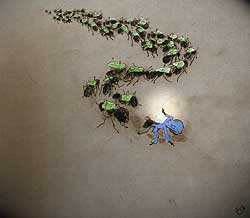
When I was in high school two of the many words used as insults shocked me. One of them was “self-sufficient.” Its stigma came from the mea culpa processes to join the Young Communists Union, where the candidates criticized themselves for not behaving — always — as part of a collective. Another pejorative terms was “conscious” or “aware,” which in that context referred to someone too intellectual, too devoted to books, too engaged in learning. The good students were labeled “super-conscious” and the natural leaders who emerged in each group also felt the taint of self-sufficiency. Better not to excel, not to overexert yourself… these disqualifiers seemed to warn us.
Worshiping individual mediocrity generates mediocre societies. Vilifying the talented and entrepreneurial hinders the development of a nation. Professional capital is not constructed only with titles, degrees and post-graduate degrees, but with the need that arises from a population that reveres knowledge. It is also imperative that intelligence is not something to be hidden, almost with embarrassment or shame. We are all potential scientists and discoverers, in need of an environment where our capabilities find respect. A country of scientists should be able to show off its laboratories and vaccines; but also ensure that ordinary people can patent their achievements and be rewarded — materially and spiritually — for their ingenuity.
There may be many university graduates in Cuba, but as long as these people do not find true social and legal recognition and salaries commensurate with their work, we can hardly call ourselves a nation of science. It’s sad that more statues are raised and more plazas dedicated to people who have wielded machetes or weapons, than to those who have saved lives with their microscopes and syringes. The prodigious milligram* of knowledge needs an environment where it can multiply. That fertile soil that carries the seed of education, the irrigation to imagine a better life through scientific discovery and the essential fertilizer of freedom.
* “An ant censured for the subtlety of its loads and its frequent distractions, found one morning, on straying once again from the road, a prodigious milligram. Without stopping to think about the consequences of the discovery, it took the milligram and put it on its back. Happily it discovered that it was the perfect load just for her. The ideal weight of that object gave her body a strange energy: like the weight of their wings on the bodies of birds.” (Taken from “The Prodigious Milligram,” Juan José Arreola, Complete Works, Mexico, Alfaguara, 1997)
** Thanks to Universal Thinking Forum for provoking this reflection … and much more.
The post El miligramo prodigioso appeared first in Generación Y by Yoani Sánchez
6 October 2013
“Socialism…” / Yoani Sanchez
Why Don’t Cubans Want to Have Kids? / Ivan Garcia
 In its official discourse, the government suggests with pride that Cubans have gone from being housewives to being academics with ambitious projects.
In its official discourse, the government suggests with pride that Cubans have gone from being housewives to being academics with ambitious projects.
The regime alleges that most women postpone motherhood until they have passed 30 years of age, the same as in the First World, for the sake of their professional careers. Opponents and dissident journalists point in another direction.
They assert that it is a problem more of an economic nature than professional pretensions. After Fidel Castro took power in January 1959, the doors of the working world opened to many women who lived maintained by their husbands, raising children, completing domestic chores and listening to radio soap operas.
But in spite of women having a more relevant role in all spheres of public life — except in politics, where they are a distinct minority — since 30 years ago, they have on average less than one child by the conclusion of their reproductive years.
I consulted 18 childless women aged between 19 and 43. Also six mothers with young children about the difficulties and shortages in raising a baby.
The figures are disturbing. The Cuban people are aging. And decreasing. More people die than are born. Other bad news is that less than one girl is born for each woman capable of bearing children.
Let’s review some numbers. The average age in Cuba is 38 years. In 2025 it will rise to 44. By then more than 26% will be more than 60 years old.
In 2030, 3.3 million people will exceed that age. Currently the group of Cubans older than 60 is 17.8%. Greater than the segment of children under 14 years which is 17.3%.
The gap, according to analysts, has to grow. Emigration is one of the factors that hampers maternity in Cuba. More than 30 thousand people leave each year for the United States or somewhere else on the planet in order to improve their precarious living conditions. The majority of those emigrants are young women and men with good academic training. It is a tragedy.
Yudelis, a 21-year-old university student, is clear. ”One of the causes of women not wanting to have children is the economic situation, which is burning. I myself live in a house with three different generations. My parents, my grandparents and I. My boyfriend has the same situation in his home. If we were to marry and try to have children, where would we live?”
Yudelis finds only one answer: ”To emigrate, nothing else occurs to me if I want to start a family. If I wait for things to improve economically in Cuba, I would never have children. It’s been bad since I was born. I do not believe things will improve in some five years.”
Eighty-five percent of the 18 women surveyed who do not have children think that the economic factor is key to not starting a family. Eleven of them live in homes with numerous family members and without the best conditions (62% of dwellings on the island are in fair or poor condition).
Elsa Lidia, 41-years-old, still has no child. She watches the calendar with worry. ”I don’t have much time. But I live on a tenement, in a little room with a barbecue. Five of us live in 30 square meters. My parents’ room is separated by a plasterboard partition. My sister and I sleep on the bed. My brother sleeps on a cot in the living room. I have a had a formal relationship for years. My partner wants to have children. But how? With my salary of 450 pesos (20 dollars) as a mid-level technician I will never be able to aspire to buy myself an apartment with a price of 10 to 20 thousand dollars.”
The future for Elsa Lidia is a bad word. ”I have no family abroad. My life project is day-to-day. When I think what is going to become of me in five years I panic.”
Some of the women surveyed who still are not mothers live in good houses, are high-caliber professionals, and receive dollars from relatives living abroad.
“But I do not want to raise my child surrounded by uncertainty. With the anguish of whether I will be able to feed him well, buy him clothes, shoes, toys… With my salary I cannot guarantee a good level of life. It is very difficult to have a family in Cuba in the current economic conditions,” says Sulia, an architect.
I was investigating with mothers who have children 5 years and under. After the flower bouquet and the unmatched emotion of childbirth, four of six consulted suffer deprivations in raising them.
And it is not a medical problem. During pregnancy the State guarantees a daily dose of iron and vitamin complex called Pre-natal. In the neighborhood offices or clinics they keep track. They advise them about adequate weight and they receive free advice about how and for how much time to breastfeed the future baby.
Even through the lean ration book they offer them an extra quota of three pounds a month of beef and fish. And some extra kilos of root vegetables. Maybe those attentions, rare in a poor Third World country, have provoked the Save the Children organization, with headquarters in London, for the second consecutive year to consider Cuba as “the best country in America to be a mother.”
Probably the British NGO ignores the problems that begin after birth.
I spoke with Yadira, a young computer science graduate. ”I have had three abortions. I took contraceptive pills. But even so I got pregnant and it was dangerous for me to undergo another D and C. I cannot stand another. We fixed the room as we could. The family gave me a crib. Through the ration booklet, the State offers you 10 meters of antiseptic cloth and gauze to make diapers, baby cologne, a pair of shoes, a cream for the baby, three soaps and a baby bottle, among other things. It costs 85 pesos. But it is not enough. If the child gets sick, as mine is, problems increase.”
The pediatrician recommended that Yadira buy in one of the foreign currency stores the formula NAM by Nestle; each can costs more than 4 CUC. ”The baby was consuming two or three cans a month. We had to sell personal articles to be able to buy them for him.”
According to the consulted mothers, some with more solvency than others, the advisable thing is to save no less than 600 dollars and to be able to guarantee a proper layette. The prices of strollers, playpens and walkers are sky-high.
One rocking cradle between 110 and 130 CUC. A playpen between 80 and 140 CUC. The stroller between 60 and 180. A crib mattress exceeds 50 CUC (the average salary in Cuba is 20 dollars a month, and one CUC, with exchange fees and taxes, is a little less than one dollar).
“Add to all that, as he grows, food, clothes, shoes toys, walks and birthdays. Even having the money, there are articles that are scarce and cost a lot I work to get them. One does not regret having a child, but in Cuba it is very hard,” says Yadira while her two-year old son sleeps rocking in an iron chair.
Iván García
Photo: Hospital Materno Ramon Gonzalez Coro de Havana. Taken from The Hard Test of Maternity.
Translated by mlk
5 October 2013
Growing Presence of the Dengue Fever Mosquito in Santa Clara / Yoel Espinosa Medrano
SANTA CLARA, Cuba, October 1, 2013, Yoel Espinosa Medrano / www.cubanet.org.- This city has a total of 657 foci of the Aedes Aegypi mosquito, 133 more compared 20 days ago, according to official data.
Juan José Pulido, director of Public Health for the area, reported on provincial radio that the situation is alarming because the current infestation rate is 1.01% with a tendency to increase, and the target rate is 0.05%. It has been exacerbated by the hundreds of homes with multiple infected sites.
The mosquitoes flourish mostly in containers where people store water.
The official did not report on the number of people infected with dengue fever.
The most affected areas are Marta Abreu, Santa Clara and Nazareno. Meanwhile, in the Arnaldo Milian Castro Provincial Hospital and the José Luis Miranda Pediatric Hospital there are dozens of people in isolation rooms and a large number being treated in their homes, supervised by a physician and community nurse .
Unofficially it is known that at least 5 people have died from this cause, including a pregnant woman.
“In the city there is also an increase in outbreaks of diarrhea, caused mostly by water pollution due to failures, both in the supply networks and in the plumbing; septic dumping the street is also an area of concern, although the local party and government have made a great effort to solve it,” reported Juan José Pulido.
From Cubanet
1 October 2013

